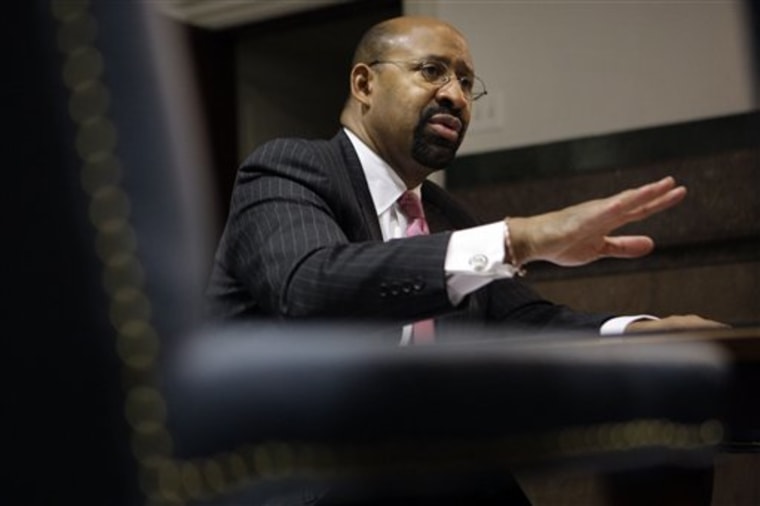Arts and cultural organizations are often dismissed as a frivolity, the first to go when the budget ax swings even as supporters tout them as powerful economic engines that employ workers and support businesses far beyond the cliche wine-and-cheese set.
And times are not good for the creative community. In Philadelphia and around the country, the arts are suffering amid drained municipal and state budgets and eroded donations from foundations and individuals alike. Jobs are being lost; museums, education and outreach are being curtailed.
But Philadelphia's mayor, in a departure from his predecessor, believes the arts are key to generating revenue and strengthening the community.
"There is something about art and music and culture that enhances the quality of life of this city," Mayor Michael Nutter said in an interview with The Associated Press. "I think, even more so in these economic times ... it helps us to cope and to deal with the madness around us, which virtually none of us can do anything about."
A battle to retain, restore funding
Around the country, arts advocates in Madison, Wis., and Oakland, Calif., have battled city officials to restore some funding, while Cincinnati has seen a 77 percent reduction in funding of arts grant programs over the last two years, according to figures from Americans for the Arts, a Washington-based advocacy group. It estimates 10,000 arts organizations could vanish in 2009.
At the opposite end of the spectrum, Seattle increased its city arts budget by $1 million in fiscal 2008, and Las Vegas has a new Neon Museum and next wants to open a mob history museum.
Nutter cited figures from a recent Philadelphia Cultural Alliance report that arts and culture in the region employs 40,000 people and generates more than $1 billion in economic activity every year. More people visit the Philadelphia Museum of Art annually than a season of Philadelphia Eagles' home games, he added.
The Philadelphia Cultural Fund's budget for fiscal 2009 was cut by 24 percent (from $4.2 million to $3.2 million) from the initial spending plan. However, that's still an overall budget increase from the previous fiscal year. The nonprofit entity allocates funds to hundreds of local organizations.
The Philadelphia Museum of Art and two smaller museums saw 20 percent cuts in city funding — a percentage comparable to other sectors of the budget. The well-known Mural Arts program and the Philadelphia Film Office's budgets also were chopped.
Different from the culture wars
"This is very different from the culture wars in the 1980s, where the arts were being singled out for cuts," said Peggy Amsterdam, CEO of the Greater Philadelphia Cultural Alliance, an advocacy group. "We're part of the community and everyone has to take a hit."
Shortly after taking office, Nutter created a Mayor's Cultural Advisory Council of some four dozen arts and cultural leaders to brief him on arts-related issues. He also reopened the Office of Arts and Culture eliminated in 2004 by former Mayor John F. Street as a cost-cutting move; it's now called the Office of Arts, Culture and the Creative Economy.
Philadelphia is not the only city to see changes with a new administration.
Rudy Giuliani, who served as New York's mayor from 1994 to 2002, routinely slashed arts and cultural funding and unsuccessfully tried to close the Brooklyn Museum of Art because he considered a painting sacrilegious.
Although New York City's Department of Cultural Affairs funding recently was cut 11.7 percent because of the deepening recession, Giuliani's successor, Michael Bloomberg, has said he wants to keep levels as high as possible.
Those opposing philosophies were seen on the national stage as lawmakers debated the $787 billion economic stimulus package in Washington.
Proponents: Arts funding creates jobs
Before being approved by Congress last month, the Senate version excluded an allocation of $50 million for the National Endowment for the Arts that appeared in the House version. Some conservative senators derided the arts as elitist trifles not worthy of consideration in an emergency stimulus bill.
Supporters of the arts worked to show a House-Senate conference committee that the arts generate revenue, promote tourism and create jobs like construction work and positions at local theaters.
Nutter also said getting children engaged in the arts must be a priority.
"If you stay out in the elements too long, you will die from exposure," he said. "In Philadelphia, part of our challenge is our kids die from lack of exposure, in many instances having no idea what's going on three blocks around their house."
